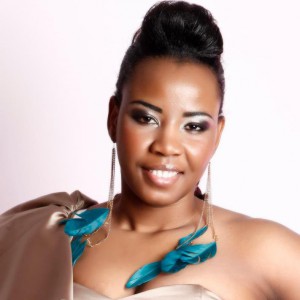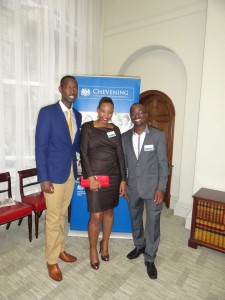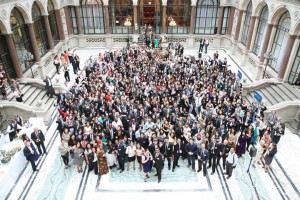20th August 2013 Windhoek, Namibia
Guest Blog by 2012/13 Namibian Chevening scholar Jennifer Kandjii
My experience as a Chevening Scholar: From Osire to London
By: Jennifer Kandjii

A famous quote by Saint Augustin states that ‘the world is a book, and those who do not travel read only a page.’ This quote among others on travelling, exposure and in general academia has been the driving force in my life. Working for UNHCR as Field Associate in the Osire Refugee Settlement, Namibia, I was excited to be awarded the prestigious Chevening Scholarship to pursue a year long MA in Refugee Studies at the University of East London.
As such prior to my arrival in the UK, I was based in Osire. Osire Refugee Settlement is located in central Namibia in the Otjozondjupa Region, situated about 200 km north of the capital Windhoek. Established in 1992 the refugee settlement has been host to over 10 000 refugees and asylum seekers from 22 countries at its peak in the early 2000s. The population has reduced to less than 5000 as a consequence of the repatriation of Angolan refugees and invocation of the cessation clause in June 2012. (See also the High Commissioner’s Blog on her visit to Osire in June 2013)

In early September 2012, I left the bustling and beautiful Windhoek, with merely 400 000 inhabitants for densely 8.174 million people in London. Moreover Namibia has total population of about 2.2 million people, but has a surface area of three times the size of the UK.
Therefore the differences are significant. In contrast to Windhoek with less streamlined public transport system, London has an efficient, but expensive, public transport network ranging from multifarious train systems, the famous London red double-decker buses, the Emirates Airline Cable Car, River ferries and the spacious London taxis. London is also Central hub of Great Britain with a rail network serving England, Wales and Scotland and a high speed train link from London to Paris – allowing for onward travel to mainland Europe and beyond.
The beauty of studying in a foreign place, and especially in a cosmopolitan and diverse city such as London, is manifold: enhancing your cultural life and worldview; building meaningful friendships across ethnic, cultural, continental and many other divides – making you realise, that despite the superficial differences, we are more similar than we are made to believe. Plus encountering fluctuating weather that has more mood swings than you will ever imagine are some of the nuances you will likely experience in London.
After the initial transition jitters of adapting to the weather and accepting, as well as gelling with another type of culture and society, living in London proofed exciting, adventurous and definitely worthwhile. The city was pregnant with avenues to discover, places to see, academic conferences and networking opportunities to engage in. The trouble with that for an adventure junkie like myself is that – it was like candy to a child.

From a socio-cultural-historic perspective London is ripe with fantastic attractions from historic buildings and monuments to top museums, parks and art galleries. That unfortunately could not all be fitted and visited within the budget and time constraints of a student – as you would imagine I deliberately choose those that had not cost attached. However, of the few that I managed to visit, they made a lasting impact on my worldview and they formed part of my wonderful UK experience. Among them the British Museum, Cutty Sack at Greenwich, the Greenwich Maritime Park and Big Ben at Westminster formed part of that experience.

When you find yourself in a city and country where academia is part of the fabric of the society, conferences of various disciplines happens to be an everyday occurrence. Being a scholar it was imperative that one takes of these opportunities to learn as much as possible, but also to share you experience and built networks with experts and other scholars within your field. At other times general events that are opportune to those based in cities such as London also occurs. From the many conferences I was part off, I was jubilant to attend the Spectator Event ‘Kofi Annan in conversation with William Shawcross’. It is not every day that one finds themselves in the same room with great African leaders.
Other daily experiences cannot be overlooked, as they were instrumental in making this a worthwhile adventure. For example getting into the Woolwich ferry from one end of the River Thames to the other; waking up to the noise of aeroplanes taking off or landing at the London City Airport; or walking in the underground tunnel in Greenwich and also event that others in Europe might consider mundane such as being a crowd of those running from one tube to the next.
There is no better way to experience the rich and depth of the diversity of a place then through its cuisine. London offers you just that. From the spicy and hot flavour of South Indian cuisine in East Ham, the opportunity to try exotic Turkish kebabs, food from Burma (or Myanmar) which I shared with fellow scholars, Chinese, Japanese and the various places in Brick lane with a Indian, Pakistan and Sri Lankan twist all gave the richness of cuisine and attested to the diversity of London.
The city is also one of paradox as one of my Professors would term it, a global city which depicts how the ‘… capillaries of globalization intersect with the threats of human life.’ This attesting to its role as a modern city, while having a rich history, also in present day is a multi faceted sphere illuminating its own complexity and unique light.
Outside London, I journeyed to other parts of England. This included visits to Manchester, Cheltenham and Nottingham while transiting Birmingham, Oxford and other cities. I am yet to journey to Aberdeen, Scotland as part of the broader UK experience.
In addition to having the opportunity of attending University at an institution with an outstanding teaching and learning experience, the UEL Docklands campus is located in the East of London right at the docks overlooking the London City Airport and with a view of the financial market of Canary Warf. But more importantly, as a student with interest in refugee issues, I was excited to learn that East London has been the point-of-entry and initial residence of many refugees who sought refuge in the UK.

The University gave me the opportunity to be taught and supervised by researchers at the leading edge of their discipline and as such published widely. Creating an environment where I was intellectually challenged and encouraged to develop skills in research and the ability to learn and work independently. In this period when I am having the daunting and exciting task of researching and writing my thesis, I look back with gratitude for the skills learned and knowledge impacted during the teaching period of the programme.
Looking forward, I am excited to put to the test the knowledge acquired during this fruitful journey. With a year experiencing the considerable rigours of postgraduate study at a prestigious internationally inclusive university, amongst colleagues from around the globe, even countries in which UNHCR have operations, I am looking forward to bringing back fresh impetus and renewed vigour to my work with UNHCR, always ensuring that refugees are centrally located and involved throughout the protection, solution and solution finding process. I am confident that my skill set is more diverse and enhanced than it was 12 months ago and I believe am better qualified to undertake more challenging responsibilities. Furthermore with the confidence I have gained through this experience I am even more determined to pursue a PhD.
In conclusion, my sincere gratitude is extended to the Foreign and Commonwealth Office through the Chevening Secretariat and the British High Commission in Namibia for granting me such a wonderful opportunity, especially in an a year when the Chevening Scholarship is celebrating its 30th anniversary. Wishing the Scholarship many more years of fruitful existence and building leaders across the world.